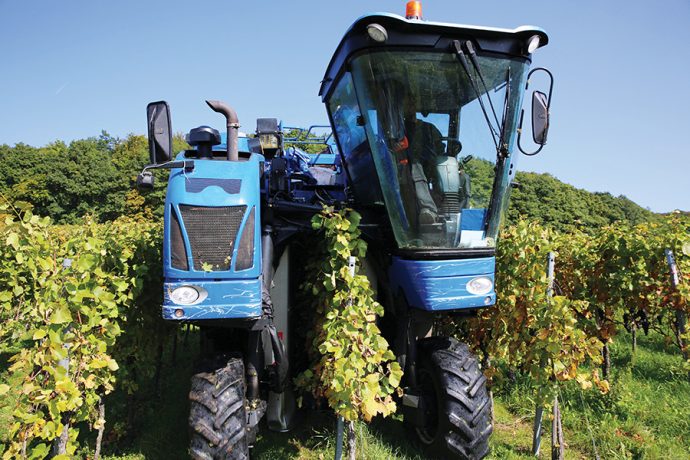Written by John Noakes
A discussion of winemaking typically conjures romantic images of passionate workers harvesting grapes and then painstakingly sorting out only the best of the bunches.
While the process of winemaking in most cases no longer entails an army of stomping bare feet — as in the vintage “I Love Lucy” episode — variations on these techniques are still in use throughout the world. In many cases, however, wine producers are focusing on new ways to enhance, simplify and create higher-quality wine from vintage to vintage.
Recently, I spoke to Michael Davies, the winemaker at A to Z Wineworks, and Rex Hill, both in Newberg, Oregon, about alien grape harvesters and the marijuana industry’s threat to vintners. Got your attention? As the expanding marijuana market in the U.S. creates intense competition for labor due to the considerably higher wages the marijuana industry pays, vineyards’ labor supplies are dwindling. Automation is emerging as the key solution to this problem.
Many vintners are deploying mechanical harvesters. A to Z is harvesting 35 to 40 percent of its crop with mechanical harvesters that roll over the grape vines like 12-foot aliens right out of a science fiction movie. They tickle the grapes free while they make their way up to a collection bin where the grapes are sorted over carefully spaced rollers that let them fall through, separating the leaves and stems above.
In cases where the vines grow on slopes, Davies says the mechanical harvesters are assisted on grades up to 35 degrees with enormous wheels working in concert with hydraulics and a gyroscope to keep the harvesters level while twisting and turning.
“The machines are great for night harvesting and cold weather, as they are more efficient and faster than humans at picking and sorting only the best grapes,” he says.
This translates to savings for the vineyard, because when the vineyards compensate workers by the weight of the grapes picked, they sometimes get stuck paying for inferior grapes. Handpicking grapes can cost between $600 and $800 an acre, whereas mechanical harvesting averages about $250 an acre. It’s easy, therefore, to see how investing between $250,000 and $350,000 per machine would be a prudent business decision.
The idea that mechanized grape harvesting and winemaking should be a practice relegated to lower-end bulk wines has been slowly fading away as higher-end producers are switching over to more technology-based production on the plane of A to Z and Rex Hill vineyards. While it may be true that some ultra, high-end vineyards throughout Napa Valley and surrounding regions that sell bottles north of $100 will never feel the economic pressure to adopt this automated approach, they will remain the exception. While many industry insiders still insist that mechanization will never close in on the exclusive high-end winemakers, the dwindling workforce and the competitive threats from marijuana may someday force their hand. When profits are on the line, no solution is off the sorting table.
So as consumers, why should we care about mechanical grape picking and processing? How is this affecting the end product sitting on your dinner table? Is technology worth the upfront capital expenditure to the vineyards? Davies thinks so: “We are saving money, time and manpower while producing an excellent product that is the equal if not better than its handpicked partner. This means more money and better prices to the consumer.”
It’s hard to argue with Davies’ results as his wines are perennial all-stars on Wine Spectator lists and receive countless awards, acknowledgments and respectable ratings from across the wine industry. If you care about drinking a higher-quality, more consistent bottle of wine, then you should be following the collaboration of wine and technology, as it is the future.

